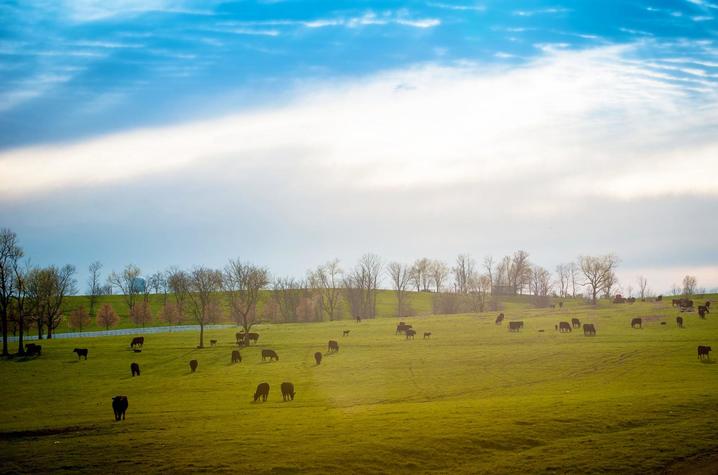UK Livestock Specialists: People Can Learn Important Lessons From Animals in Tough Times

With all the uncertainty in the world during the COVID-19 crisis, University of Kentucky animal scientists say people could learn quite a few lessons from farm animals.
Animals have their own culture in how they deal with life and the stresses that come along. They have relationships, disagreements, collaborations and many other things to which humans can relate.
“Cattle are normally quiet, but they become vocal when separated from the herd or when they are looking for a herdmate or a calf,” said Jeff Lehmkuhler, beef specialist for the University of Kentucky College of Agriculture, Food and Environment. “Seems like the loudest voice is always heard. I think we could be more like that as people and leverage our loud voice toward the important stuff.”
UK equine specialist Bob Coleman said that while we are feeling confined by social distancing orders, we can take heart that horses get irritable in the same situations.
“When horses are confined with little to do, they get grumpy,” he said. “Perhaps horse owners could find mutually enjoyable activities with their horses and alleviate boredom. Also, we should have patience with those around us, because they may be having a difficult time feeling bored and confined as well.”
In that same vein, parents suddenly home with out-of-school children may be feeling a little impatient as they try to help with online homework and manage their own work-from-home duties and normal household chores without much opportunity to take a break. Chickens deal with these situations with ease. New chicks are always pecking at anything that moves, even their mother’s eyes. They are constantly grabbing at anything to get some attention, using the mother hen as a jungle gym, testing her patience.
“The hen doesn’t let it get to her,” said Jacquie Jacob, UK extension project manager for small and backyard flocks. “She knows all that activity is teaching them to grow into strong chickens who know how to get what they need. She sacrifices her comfort for their development.”
Animals also know how to take care of each other. Sheep know their survival is more likely in a flock of many. Being alone, makes them more vulnerable to predators. While most Americans are having to practice a little social distancing right now, they can still take advantage of modern technology to “flock” together and ward off predators of illness, fear and boredom.
“We can also learn a lot from the way shepherds tend to the flock,” said Debra Aaron, UK animal sciences professor. “The shepherd takes care of the entire flock, but he or she is also very good at seeking out a sick or injured animal with that flock. When the shepherd takes care of the sick individual, the entire flock is healthier and stronger.”
Animals know when to push through, when to play and how to focus. They live focused on the moment and don’t get distracted by the past or the future. They heed their instincts to stay alert to their senses and to each other. They stay focused on what is most important. And, when it’s all too much for them, they understand how important it is to rest. They seem to instinctually know they need rest to thrive and get along.
“Have you ever seen cows fighting? They mostly live in harmony,” Lehmkuhler said. “Look at the wide-open pastures we have in Kentucky. The cows have plenty of room to spread out, but they prefer to be together.”
Check on each other; learn to recognize the signs of stress in your tribe.
“Signs of illness and pain in cattle can often be subtle and easily overlooked,” said Katie VanValin, UK beef specialist. “Overlooking mild symptoms leaves the door open for larger problems in the herd. Now, while we are self-distancing, we need to remember that what might cause mild illness in some, could be a much greater problem for others.”
VanValin said that cattle handlers also teach a good lesson.
“Understand that cattle are a prey species, so they often have a fear of the unknown or unfamiliar, just like us. Those situations cause stress and anxiety for cattle and for us,” she said. “For cattle, the attitude of the handler can either alleviate or heighten that anxiety and stress. For our part, when we speak and act purposefully and with positivity, we can help ease fear and anxiety of those around us.”
Credits
Aimee Nielson (Agricultural Communications)

